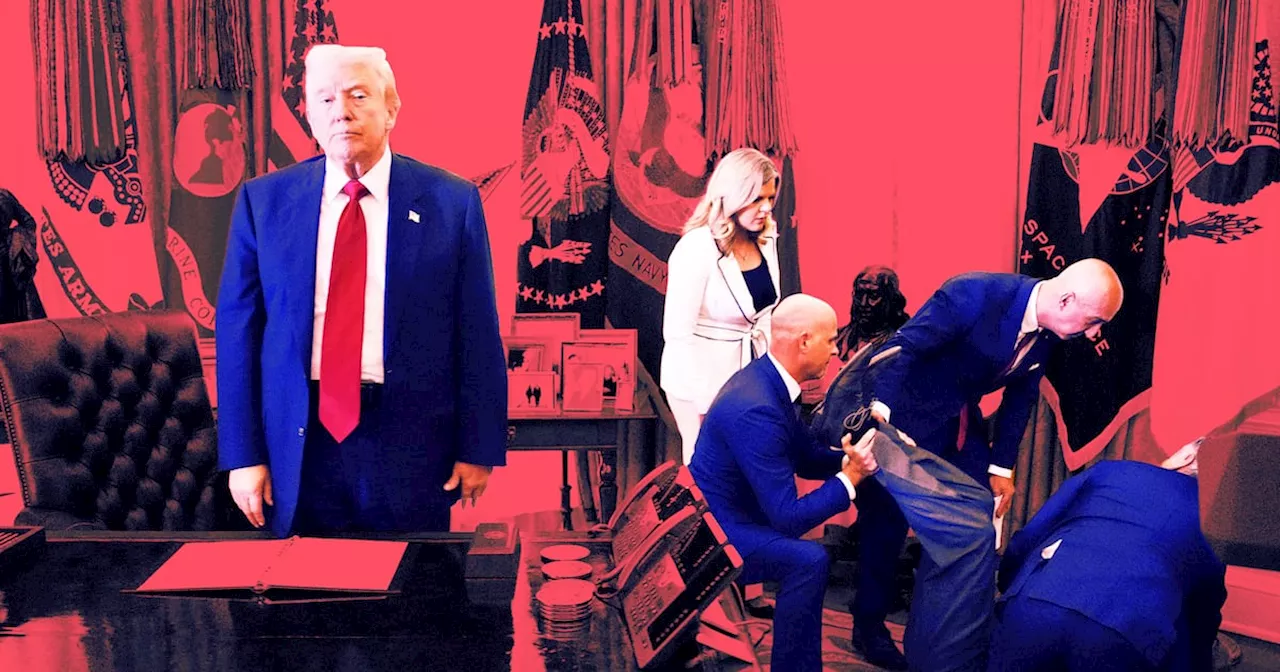An iconic photograph of former President Donald Trump taken during a press conference in the Oval Office has sparked significant discussion regarding his leadership style and priorities. Captured shortly after an assassination attempt on his life in July 2025, the image shows Trump with a raised fist, exuding defiance. This moment, while widely interpreted as a display of resilience, also highlights a troubling narrative about his connection to the suffering of others.
In the photograph, Trump stands at the Resolute Desk, seemingly oblivious to the chaos unfolding behind him. A man, later identified as a businessman, collapsed during the announcement regarding cuts to Medicare and Medicaid prices for certain weight-loss drugs. Surrounded by aides, including Dr. Mehmet Oz, the scene underscores a stark contrast between the president’s focus on his own image and the well-being of those around him.
As the media was ushered out of the room, Trump appeared more concerned with maintaining his composure in front of the cameras than addressing the immediate health crisis behind him. His lack of visible empathy has drawn criticism, suggesting a deeper issue related to his leadership approach.
The incident occurred against a backdrop of significant national challenges. Flights were being canceled due to a government shutdown caused by legislative gridlock, leaving hundreds of thousands of federal workers without pay. While Trump was promoting an expensive weight-loss solution, his lawyers were arguing in court against providing Supplemental Nutrition Assistance Program (SNAP) benefits to vulnerable populations.
“The Trump who turned his back on a man in trouble was symbolic of something very different—a president who is indifferent to the suffering of his countrymen,”
noted observers following the event. This sentiment encapsulates the broader perception of Trump’s presidency, especially during moments where empathy is crucial.
As the photographer captured Trump’s moment of triumph, it revealed not just a leader who relishes the spotlight but also one who may struggle to connect with the human experiences of those he governs. The businessman who fainted had to be assisted by Dr. Oz, who quickly recognized the emergency and acted to stabilize him. This incident, combined with Trump’s reaction, raises questions about the emotional intelligence required in leadership roles.
At 79 years old, Trump’s recent international travel has also taken a toll, with signs of fatigue evident during the announcement. The juxtaposition of his defiant pose against the backdrop of a medical emergency has led many to reflect on the implications for Trump’s legacy, both as a president and as an individual.
Looking ahead, the significance of this photograph may resonate beyond its immediate context. It may ultimately serve as a poignant reflection on a leader’s priorities and the human cost of political decisions. As the public continues to scrutinize Trump’s actions, this image may become a symbol of the ongoing debate about leadership qualities and the responsibilities that accompany power.
